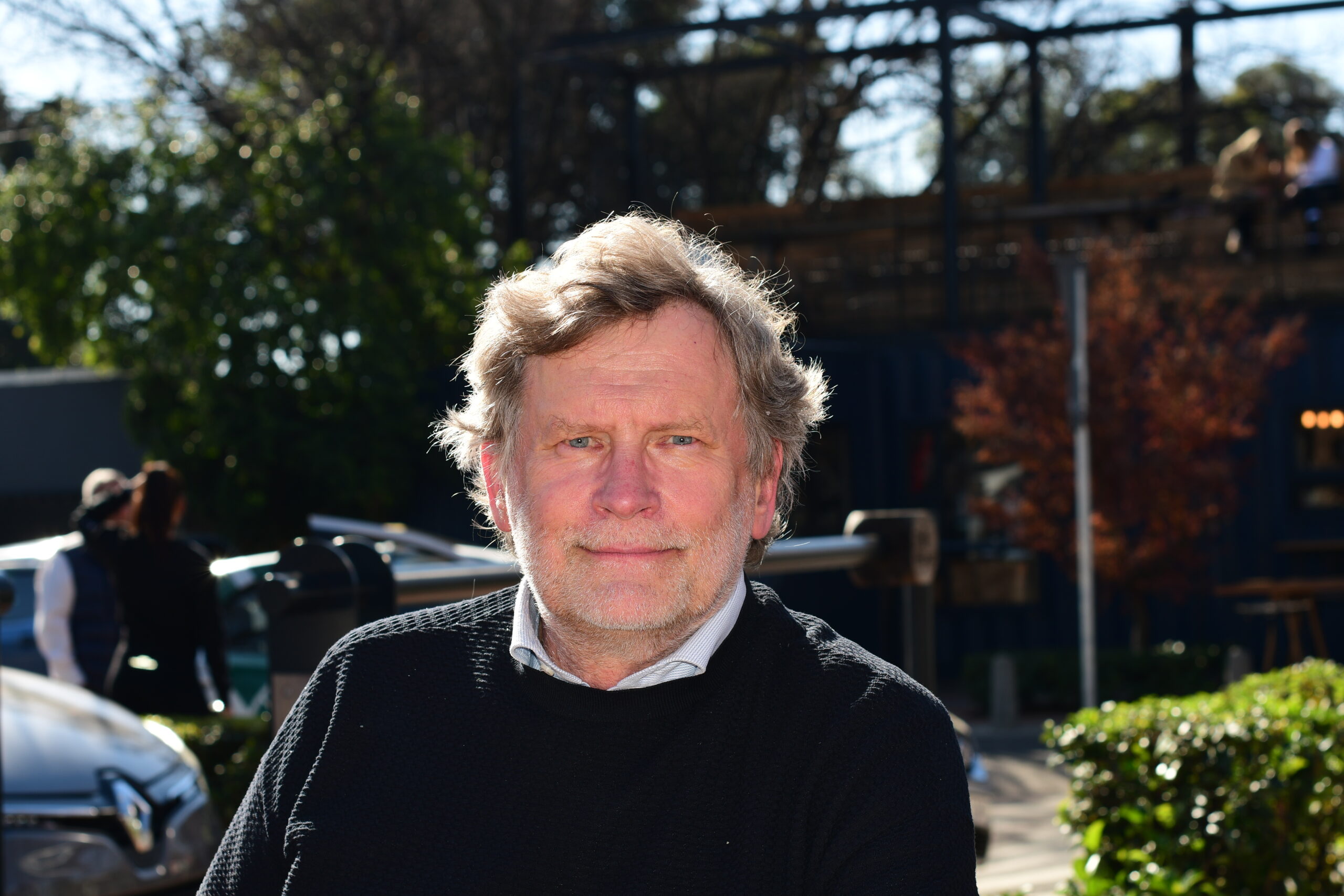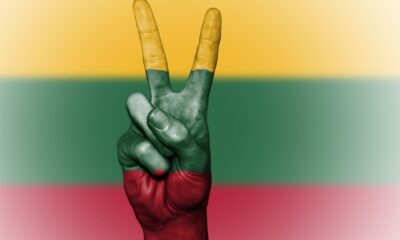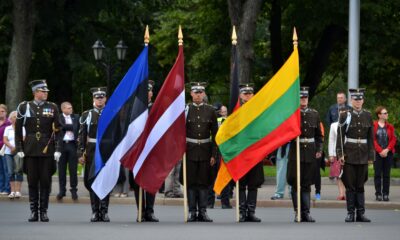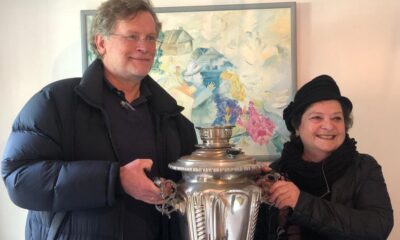
Featured Item

Farewell to the ambassador from ‘Der Heim’
Published
8 months agoon
Last month, the Lithuanian ambassador to South Africa, Dainius Junevičius, packed up his official residence, boarded a plane back to Vilnius, and retired from public life, after a long distinguished diplomatic career.
He left behind many friends in South Africa. In addition to being his country’s representative in South Africa, Junevičius has been the fulcrum in the relationship between the Lithuanian government and Litvaks, Jews of Lithuanian decent, around the world. Prior to his departure from Pretoria, Howard Sackstein, the chairperson of the SA Jewish Report, met the ambassador for a frank discussion.
Why does a small country like Lithuania have such a big presence in South Africa?
One of the reasons why Lithuania has an embassy in South Africa is the big Lithuanian Jewish community. We have more than 3 000 Lithuanian citizens here, and of course, South Africa is an important country on the African continent.
Most of the Jews left Lithuania for South Africa before 1930. At that time, antisemitism in Lithuania was less than in South Africa. The main reason for immigration was economic benefits and family connections. In the 19th century, an additional factor was young men who didn’t want to serve in the Russian army.
For many Jews in South Africa, obtaining a Lithuanian passport and thereby access to the European Union is a priority.
Lithuania is indeed open for those who would like to reinstate their citizenship. We did a lot to make this process easier and to remove some limitations to get citizenship. Only about 15% to 20% of applications are unsuccessful. Most of the applications have positive results.
One of the concerns isn’t the policy on the reinstatement of citizenship but the practice – the bureaucrats who implement the policies may not be as supportive of the process as some of the politicians.
It’s quite a long process, but the rules are clear. It’s clear what type of documents you have to present, and how to do that. And now it’s even easier because you can apply online. Of course, you can get the help of lawyers, but you can do it on your own without additional expenses.
It’s no secret that South Africa’s support for Russia has caused rifts between European ambassadors and the South African government. What’s the relationship like now?
Although South Africa says it’s neutral, we consider that it is supporting Russia, and it was the biggest disappointment for me and, I think, all European countries.
Has that put a strain on relations between the countries?
The deputy minister of international relations and cooperation, Alvin Botes, went to Lithuania for political consultation last October, and the deputy ministers met. They had open, frank discussions, and we know the positions of each country.
As part of the SA Jewish Report webinar series, we flighted the movie J’accuse, the story of how Jonas Noreika, a genocidal Holocaust war criminal, became a national hero in Lithuania. The movie had a huge response, with more than 106 800 people watching in a week.
The film had a big audience. It was screened recently in Vilnius, in the Jewish Public Library. Silvia Foti was present, her book was published in Lithuania, and it’s a topic which we don’t avoid. I didn’t watch the whole movie, but we know the position of Grant Gochin. Some things he states are correct, especially some history, and there are people who still have monuments to them although it’s clear that they took part in the Holocaust. I hope that they will be removed.
Gochin is incorrect about what the Lithuanian government is doing. The position is clear. There’s no place for antisemitism, and there’s no place for distortion of the Holocaust or Holocaust denial. There are problems which have to be solved at a lower municipal level.
What’s the status of the Noreika monument?
It’s a plaque on the building in which he worked after 1944 when he returned from Stutthof concentration camp. The plaque states that he worked in this building and was caught and sentenced to death by the communist regime. Currently the building is under renovation, the plaque has been removed.
Who makes the decision whether the plaque goes back up?
It could be the director of the library or the municipality. I don’t know exactly which.
If it does go up again, was Grant Gochin correct? Isn’t this the litmus test?
Let’s wait. The renovation will be finished by the end of the year. But it’s complicated because he was a controversial figure. He fought for Lithuanian independence. He fought against the Soviet occupation, so people see only that.
In the same way that some people believe that the legacy of colonialism was a good thing because they built good roads?
History is complicated. It’s not an easy thing, but we have to be sincere. If a person committed crimes, then all other merits are deleted.
What are Lithuanian children taught about the Holocaust and Lithuania’s role in it? Is there an acceptance of accountability for the Holocaust? Although instigated by the Nazis, the Holocaust in Lithuania was perpetrated by the people next to whom the Jewish community had lived for hundreds of years. Is that part of the school curriculum?
How the Holocaust is presented depends very much on the teacher who does that, but the Holocaust is in the curriculum for Lithuanian schools. Today there are more than 150 tolerance education centres teaching children about the history of Holocaust and the Soviet resistance, about the local community which disappeared. Those teachers work in collaboration with Yad Vashem.
Before you leave, what are your thoughts about South Africa?
I’m disappointed that the country at age 30 hasn’t progressed as it could have. Or you could even say it’s declining in some senses. You see it with Eskom and the railways. But, we’ll have the best memories of South Africa.
What are you planning to do now?
I will change my life completely. I’ve been researching the history of photography for many years. But now I’ll devote my life to this.
My successor will come in one to two months. She’s a young diplomat. I hope that she will maintain relations with the Jewish community and, in fact, intensify them. The Jewish community is part of South African society to which you don’t need to explain what Lithuania is. So it’s a bridge between Lithuania and South Africa.
Do you have a farewell message for the South African Jewish community?
I want to thank everybody for how my efforts were received. I’m also grateful to everyone who helped me and who was involved in different joint projects in Johannesburg and Pretoria, Cape Town, and elsewhere.











Grant Gochin
Sep 14, 2023 at 7:06 pm
Lies, lies and more lies. https://blogs.timesofisrael.com/lies-lies-and-more-lies-2/
Illana Klevansky
Sep 16, 2023 at 11:38 am
What a weak interview with the now ex-ambassador…. still in the Lithuanian style of equating the Holocaust with Soviet occupation.
Still mealy-mouthed about the Holocaust only being taught by teachers who choose to (i.e.those who are in denial about their forefathers murderous past) Still making excuses about Noriega’s disgraceful Nazi past…..
It was not the Soviet regime who murdered and slaughtered 95% of Lithuania’s Jews between 1941and 1945: it was their Lithuanian collaborators, citizens, former friends and neighbours who enthusiastically decimated our Litvak families and relatives.
Grant Gochin
Sep 28, 2023 at 8:09 pm
Times of London ran this article today:
https://www.thetimes.co.uk/article/yad-vashem-tells-lithuanian-mps-to-stop-glorifying-war-criminals-who-massacred-jews-d5szmsk75
The Lithuanian Parliament spokesperson issued the same lie again: “it is not us, it is a municipal issue”. I previously deconstructed this lie here: https://blogs.timesofisrael.com/lies-lies-and-more-lies-2/
Nonetheless, they keep officially repeating it – at least twice now since I exposed it.
1. Lithuanian Ambassador Junevicius said it here after I had already exposed it: https://www.sajr.co.za/farewell-to-the-ambassador-from-der-heim/
2. And, again today.
Certainly there must be more but I am unaware of those.
Telling blatant lies to the Times of London is never a good strategy, but they seem to be out of all other options.
The Court of Public Opinion has proven vastly more effective than having attempted to do this with less publicity through the Lithuanian Government and Courts. Eventually we will make J’Accuse! louder than all their lying propaganda combined, and then, they will have no option but to drop their boycott against us, and begin to communicate.
It is astounding that in Junevicius’s statement, he claims a private event, boycotted by the government, was a government event. They have no integrity. Absolutely none.